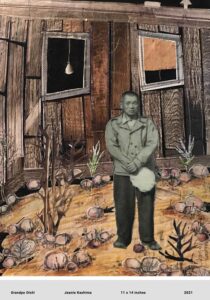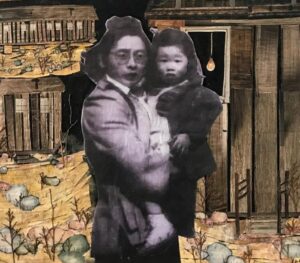The Story of the Oishi Family Farm
- By Chris Mittelstaedt
- Last Updated On
- Reading Time: 3 mins.
This newsletter is dedicated to the Japanese-American Internees
The Oishi family was part of the farming community of Japanese immigrants and Americans of Japanese ancestry who were flower growers and founded, along with Americans of Italian ancestry, the wholesale San Francisco Flower Mart. Seizo Oishi, a Japanese immigrant who had worked long hours in the agricultural fields of California, eventually bought land in Richmond, CA, where he started a wholesale flower nursery.
During World War II, the Oishi family, including Seizo’s pregnant daughter Amy, her husband Thomas Takaki and their toddler Glen, was incarcerated by the United States government under Executive Order 9066, which forced all residents of Japanese ancestry, including American citizens, to leave their homes, businesses, properties, and farms to move to enemy incarceration camps. Amy delivered the Topaz War Relocation Camp’s first baby, her daughter, Jeanie, on the concrete floor of the laundry room in an uninsulated wooden structure surrounded by barbed wire.
 A couple decades later in San Diego, Jeanie, (now going by her married last name of Kashima), was a young mom who befriended my mother. I was about 4 years old, the same age as Jeanie’s son Kenn, and we became fast friends. My memories of that time were of strawberries growing in the backyard and running around barefoot on the grass under the warm San Diego sun. My mother and Jeanie found that they shared a love for art, especially quilting. After my family moved away to the east coast, my mom and Jeanie continued their friendship and their hobbies, sharing quilt design ideas, telephone calls, and occasional visits.
A couple decades later in San Diego, Jeanie, (now going by her married last name of Kashima), was a young mom who befriended my mother. I was about 4 years old, the same age as Jeanie’s son Kenn, and we became fast friends. My memories of that time were of strawberries growing in the backyard and running around barefoot on the grass under the warm San Diego sun. My mother and Jeanie found that they shared a love for art, especially quilting. After my family moved away to the east coast, my mom and Jeanie continued their friendship and their hobbies, sharing quilt design ideas, telephone calls, and occasional visits.
I didn’t know about Jeanie’s time in the internment camp as a child. It wasn’t until I was older that I learned about her story. And recently I learned how her experience has influenced her art.
Photography was outlawed at Topaz and internees were not allowed to have cameras in the camps, “So many of those children born in camp and young children do not have photos of themselves,” Jeanie told me. The photos that Jeanie has of her family during that time were thanks to two uncles who were in the U.S. Armed Forces and therefore allowed to bring cameras into camp.
During the pandemic, Jeanie took the family’s Topaz photos, enlarged them, and began to use them in her collage work. These collages reflect the life of her family in the Topaz Relocation Camp.
Jeanie presented her collages and her family’s story in early 2023 at an event at the Rosie the Riveter WWII Home Front National Historic Park in Richmond, CA, telling the audience that “only in the past few years did I realize that the photos were important. I wanted to capture this moment in time with my own family.”
Jeanie spoke in a soft but clear manner about the efforts of her grandfather and her father to bring beauty and sustenance to the community at Topaz. “My father studied landscape architecture at U.C. Berkeley and because of his background he was one of the landscape supervisors at Topaz.”

Jeanie’s family are, in my opinion, examples of heroic American stewards who experienced adversity and injustice and continued to tend lovingly to the land and the people in their communities. Her family continued to farm after WWII and then later sold Oishi Nursery to the city of Richmond. The land is now being developed as affordable housing. Jeanie’s family is just one example of the inspiring community strength and land stewardship of Americans of Japanese ancestry.
Amy with Baby, Jeanie Kashima, 20 x 20 inches, 2021.
If you’d like to learn more about Jeanie’s work, you can see her project Topaz Birth here or see the whole series of Topaz Collages in person at the Visions Museum of Textile Arts in San Diego, CA until May 27, 2023.
Recent Articles
Office Potluck Inspiration: Fruit Boards to Wow Your Coworkers
Summer Fruit Recipes to Savor at the Office
Back-to-Work Wellness Tips for a Successful Q4
The 5 Best Fruits for Protein (and How to Enjoy Them at Work)
How to Choose the Right Organic Produce Supplier for Your Office
Subscribe to our Newsletter
"*" indicates required fields



